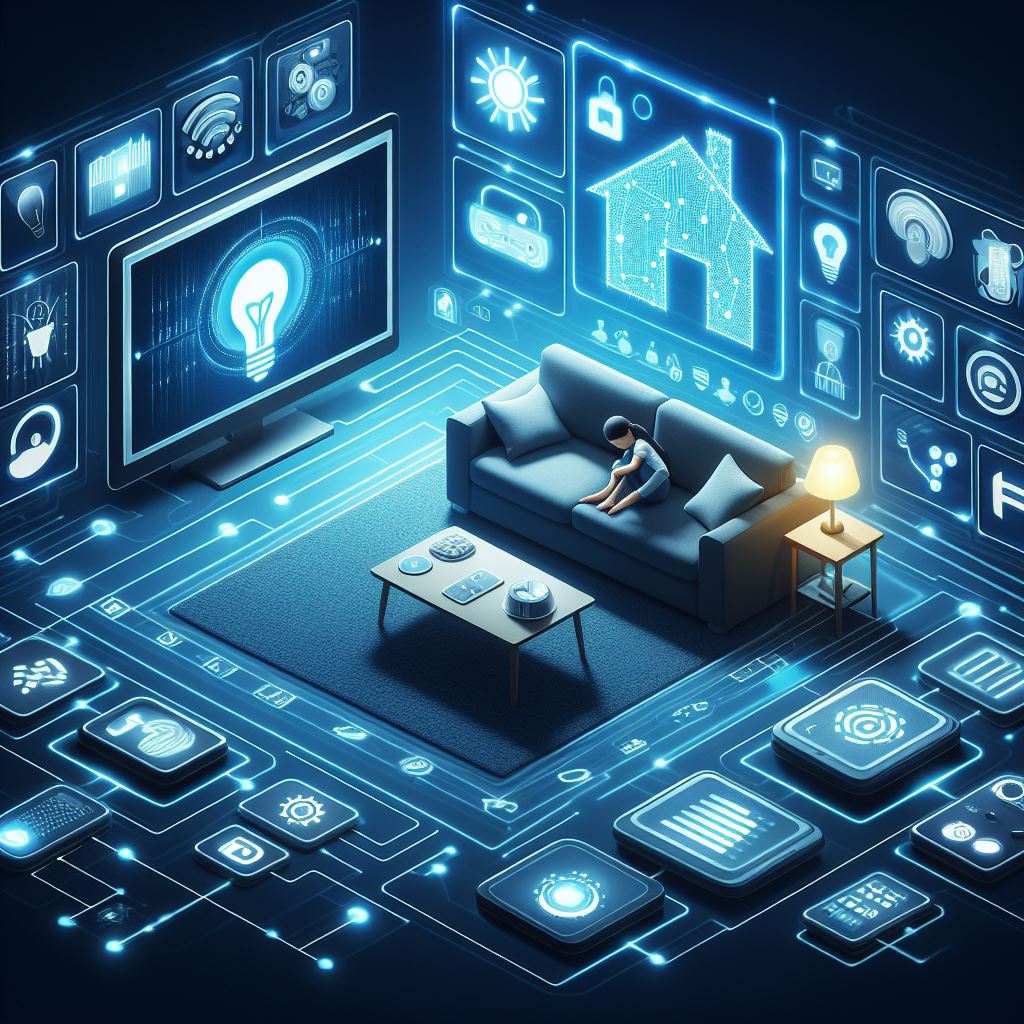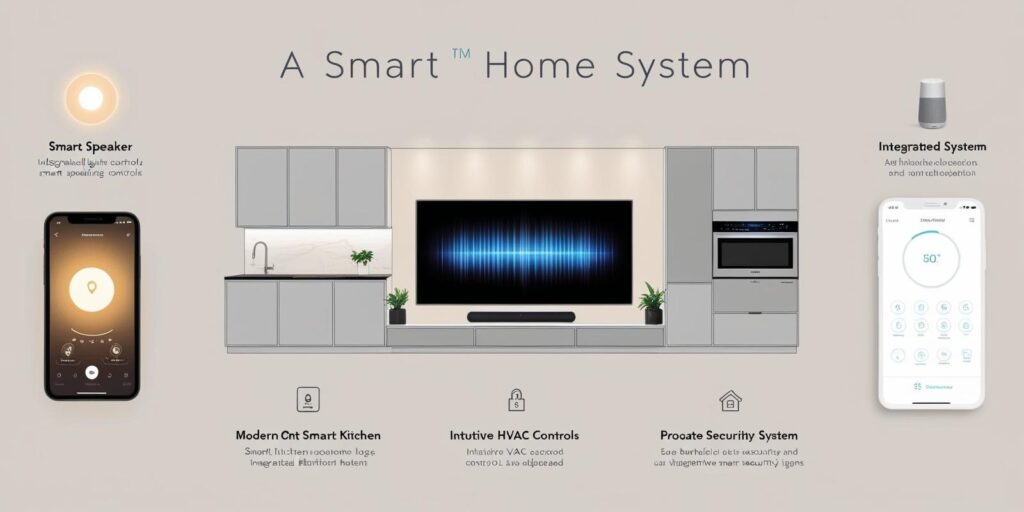The concept of smart homes has evolved from futuristic imagination to a living reality, fundamentally transforming the way we interact with our living spaces. Today, the global smart homes industry is witnessing rapid growth, driven by technological innovations in IoT (Internet of Things), artificial intelligence (AI), and home automation systems. With rising consumer demand for convenience, security, and energy efficiency, smart home technologies are steadily becoming mainstream, turning traditional residences into intelligent, connected ecosystems.

The Rise of Connected Living
IoT is at the core of the smart home revolution, allowing various household devices and appliances to connect, communicate, and automate tasks. From smart thermostats that learn personal temperature preferences to lighting systems that adjust based on occupancy or time of day, IoT-enabled devices are making homes smarter and more responsive to user needs. The seamless connectivity of appliances, security systems, and entertainment hubs has created an entirely new market focused on improving daily living experiences.
Moreover, the increasing adoption of wireless technologies such as Wi-Fi 6, Zigbee, and Bluetooth Low Energy (BLE) has accelerated the integration of smart devices, allowing users to control and monitor their homes remotely through smartphones, tablets, or voice assistants.
Artificial Intelligence Fuels Personalization
Artificial intelligence is transforming smart homes into adaptive environments. AI-driven systems can analyze usage patterns, optimize energy consumption, and even predict homeowners’ needs. Voice-controlled assistants like Amazon Alexa, Google Assistant, and Apple’s Siri leverage natural language processing to provide intuitive control over connected devices. AI algorithms can also recommend personalized routines, such as setting lighting moods for different times of the day or adjusting appliances based on user behavior.
Beyond convenience, AI enhances home security through advanced surveillance systems that incorporate facial recognition, anomaly detection, and intelligent alerts. These innovations are making residential security not just reactive but proactive, significantly improving home safety.
Download PDF Brochure @ https://www.marketsandmarkets.com/pdfdownloadNew.asp?id=121
Automation: The Heart of Smart Homes
Home automation serves as the foundation that ties together IoT and AI, enabling multiple systems to work in harmony. Automation platforms allow users to create routines where various devices work together seamlessly. For example, with a single voice command or automated trigger, a smart home can turn off lights, lower window blinds, adjust the thermostat, and arm the security system simultaneously before bedtime.
Automation also plays a pivotal role in energy efficiency. Smart energy management systems can adjust appliance usage based on peak or off-peak hours, helping homeowners reduce energy costs and contribute to environmental sustainability. Additionally, the integration of renewable energy sources, such as solar panels with home automation systems, is an emerging trend fueling green living initiatives.

Impact of AI on Smart Home Products
Lighting Controls
AI is revolutionizing lighting controls by enabling predictive and adaptive lighting systems. These systems learn user habits and adjust brightness and color temperature automatically based on time of day, mood, or activity. AI integration also allows lights to respond dynamically to external conditions, like natural sunlight, creating energy-efficient and personalized environments.
Smart Speakers
Smart speakers serve as the central interface for AI-powered smart homes. With advanced natural language processing (NLP), AI enables seamless voice commands, contextual understanding, and integration with other smart devices. AI-driven voice assistants can learn preferences, offer personalized recommendations, and control entire home ecosystems, making smart speakers indispensable in connected living.
Entertainment
AI enhances entertainment systems by curating personalized content recommendations based on user viewing or listening history. Integrated with smart TVs, projectors, and audio systems, AI ensures optimized sound settings, adaptive video quality, and multi-device synchronization for immersive entertainment experiences. Voice-controlled entertainment, powered by AI, further simplifies media navigation.
Smart Kitchen
AI in the kitchen brings automation to cooking, grocery management, and appliance control. Smart refrigerators suggest recipes based on available ingredients, while ovens and cooktops use AI to adjust cooking times and temperatures for optimal results. AI-powered assistants can even order groceries or notify users about expiration dates, making kitchens more intelligent and efficient.
HVAC Controls
AI-driven HVAC systems analyze occupancy patterns, weather forecasts, and energy consumption trends to maintain ideal indoor climates while minimizing energy use. By learning user behavior, these systems automatically adjust temperature settings and airflow for comfort and efficiency, contributing to significant cost savings on energy bills.
Security & Access Controls
AI transforms home security through facial recognition, motion detection, and predictive threat analysis. AI-enabled cameras can differentiate between regular household members and unknown visitors, reducing false alarms. Security systems with AI can predict unusual activity patterns, automate access permissions, and integrate with law enforcement notifications for enhanced protection.
Market Outlook and Future Trends
The Future of global smart home industry was valued at USD 84.5 billion in 2024 and is projected to reach USD 116.4 billion by 2029; it is expected to register a CAGR of 6.6%. Factors such as increasing urbanization, rising disposable incomes, and heightened awareness of energy conservation are further propelling market demand. Regions like North America, Europe, and parts of Asia-Pacific are leading in adoption rates, while emerging markets are gradually catching up due to improving internet infrastructure and falling device costs.
Looking ahead, the convergence of smart homes with technologies like 5G, blockchain, and augmented reality (AR) will unlock new dimensions in residential living. Future smart homes will be more autonomous, self-learning, and capable of predictive actions, ultimately offering residents greater control, security, and comfort.
As the industry matures, interoperability among different brands and platforms remains a critical challenge that manufacturers and technology providers must address. Efforts toward establishing universal smart home standards will ensure seamless device integration and better user experiences across the ecosystem.
The smart homes industry is no longer just about convenience—it represents a major shift toward intelligent, connected, and sustainable living. Powered by IoT, AI, and automation, smart homes are becoming an essential component of modern life, driving technological innovation while shaping the future of residential living. As more households embrace these solutions, the promise of smarter, safer, and more personalized homes becomes an exciting and inevitable reality.
Frequently Asked Questions (FAQ)
1. What is driving the growth of the smart homes industry?
The rapid adoption of IoT (Internet of Things), advancements in AI, and growing consumer demand for convenience, security, and energy efficiency are key drivers fueling the expansion of the smart homes market globally.
2. How does IoT contribute to smart home development?
IoT enables seamless connectivity between home devices, allowing them to communicate and work together. This creates an integrated ecosystem where appliances, lighting, security systems, and entertainment can be controlled from a single platform or remotely.
3. What role does AI play in smart home technology?
AI adds intelligence to smart devices, enabling them to learn user preferences, automate daily routines, predict needs, and provide personalized recommendations for improved comfort, security, and efficiency.
4. Why is automation important in smart homes?
Automation simplifies household tasks by allowing devices to operate automatically based on schedules, user habits, or environmental changes—enhancing convenience and reducing energy consumption.